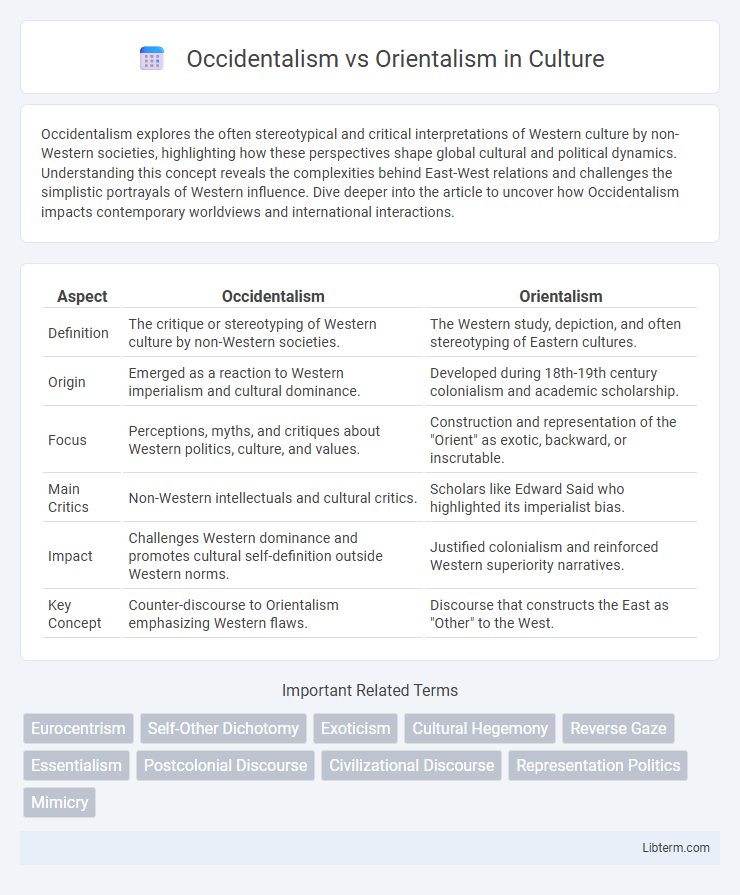Occidentalism explores the often stereotypical and critical interpretations of Western culture by non-Western societies, highlighting how these perspectives shape global cultural and political dynamics. Understanding this concept reveals the complexities behind East-West relations and challenges the simplistic portrayals of Western influence. Dive deeper into the article to uncover how Occidentalism impacts contemporary worldviews and international interactions.
Table of Comparison
| Aspect | Occidentalism | Orientalism |
|---|---|---|
| Definition | The critique or stereotyping of Western culture by non-Western societies. | The Western study, depiction, and often stereotyping of Eastern cultures. |
| Origin | Emerged as a reaction to Western imperialism and cultural dominance. | Developed during 18th-19th century colonialism and academic scholarship. |
| Focus | Perceptions, myths, and critiques about Western politics, culture, and values. | Construction and representation of the "Orient" as exotic, backward, or inscrutable. |
| Main Critics | Non-Western intellectuals and cultural critics. | Scholars like Edward Said who highlighted its imperialist bias. |
| Impact | Challenges Western dominance and promotes cultural self-definition outside Western norms. | Justified colonialism and reinforced Western superiority narratives. |
| Key Concept | Counter-discourse to Orientalism emphasizing Western flaws. | Discourse that constructs the East as "Other" to the West. |
Defining Orientalism: A Historical Overview
Orientalism, as defined by scholar Edward Said, refers to the Western academic and artistic representation of Eastern societies, often characterized by stereotypes and a colonial mindset. This concept emerged prominently during the 18th and 19th centuries amid European imperial expansion, shaping Western perceptions of Asia, the Middle East, and North Africa. The historical overview highlights Orientalism's role in reinforcing power dynamics and cultural hegemony through distorted knowledge and imagery of the East.
Understanding Occidentalism: Origins and Concepts
Occidentalism refers to the critical and often stereotypical perceptions of the Western world by non-Western societies, emerging prominently during periods of colonial resistance and ideological conflict. Its origins trace back to postcolonial discourse, where it serves as a counter-narrative to Orientalism, highlighting Western cultural, political, and economic domination. Key concepts of Occidentalism include the portrayal of the West as monolithic, materialistic, and morally decay, used to construct alternative identities and justify anti-Western sentiments.
Key Differences Between Occidentalism and Orientalism
Occidentalism critiques Western societies by emphasizing themes of cultural imperialism and modernity's perceived flaws, contrasting with Orientalism, which analyzes how Western narratives exoticize and stereotype Eastern cultures. While Orientalism often involves Western interpretations that construct the East as the "Other," Occidentalism reverses this dynamic by portraying the West through oppositional Eastern perspectives. The key difference lies in their directional gaze: Orientalism is a Western analytical framework about the East, whereas Occidentalism reflects Eastern or non-Western critiques of the West.
Cultural Stereotypes: East vs. West Perspectives
Occidentalism and Orientalism both involve cultural stereotypes rooted in contrasting East versus West perspectives, where Orientalism often depicts Eastern societies as exotic, irrational, and backward, reinforcing Western superiority. Occidentalism, conversely, frames the West as materialistic, aggressive, and morally corrupt from an Eastern viewpoint, highlighting cultural misunderstandings and reciprocal misrepresentations. These stereotypes shape global cultural narratives, influencing international relations and perceptions between diverse civilizations.
The Role of Power in Shaping Narratives
Orientalism and Occidentalism both illustrate how power dynamics shape cultural narratives, with Orientalism reflecting Western dominance that constructs the East as exotic and inferior to justify colonial control. Occidentalism, conversely, represents Eastern or non-Western critiques that depict the West as culturally arrogant or morally corrupt, challenging Western hegemony. These mutually reinforcing discourses reveal how power influences identity formation, perpetuating stereotypes to maintain or contest geopolitical hierarchies.
Representation in Art, Media, and Literature
Occidentalism and Orientalism manifest distinct patterns of representation in art, media, and literature, often shaping cultural perceptions through stereotypes and exoticism. Orientalism typically depicts Eastern societies as mystical, backward, or decadent, reinforcing Western superiority in visual arts, colonial literature, and film. Conversely, Occidentalism portrays the West as materialistic, imperialistic, or morally corrupt, reflecting counter-narratives in Eastern media and literature that challenge Western dominance and ideology.
Postcolonial Critiques: Challenging Established Views
Postcolonial critiques of Occidentalism and Orientalism dismantle stereotypical representations by exposing how colonial power dynamics shaped these narratives. Scholars reveal how Orientalism constructed the West as superior and the East as exotic or backward, while Occidentalism serves as a counter-discourse challenging Western dominance. This critical approach emphasizes the need to decolonize knowledge and recognize the multiplicitous identities and histories marginalized by these dichotomies.
Globalization’s Impact on East-West Perceptions
Globalization has intensified interactions between East and West, reshaping Occidentalism and Orientalism by exposing cultural stereotypes and fostering hybrid identities. The increased flow of information and migration promotes a more nuanced understanding, challenging traditional binary views and encouraging intercultural dialogue. Digital media platforms amplify diverse narratives, influencing how societies perceive each other in an interconnected world.
Contemporary Relevance of Occidentalism and Orientalism
Occidentalism and Orientalism shape contemporary global narratives by influencing cultural stereotypes and political discourse between the West and East. Occidentalism critiques Western dominance and values, often reflecting resistance in non-Western societies, while Orientalism perpetuates exoticized and patronizing views of Eastern cultures in Western media and academia. Understanding these concepts is essential for addressing biases in international relations, media representation, and cross-cultural communication today.
Towards Mutual Understanding: Bridging Cultural Divides
Occidentalism and Orientalism represent reciprocal frameworks that often stereotype and oversimplify Eastern and Western cultures, creating barriers to cross-cultural dialogue. Bridging these divides requires critical examination of these constructs to foster empathy, nuanced perspectives, and mutual respect between diverse societies. Emphasizing shared human values and intercultural exchange promotes deeper understanding and cooperation in global contexts.
Occidentalism Infographic

 libterm.com
libterm.com